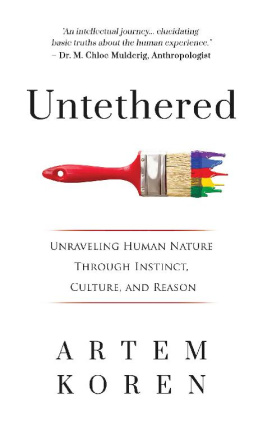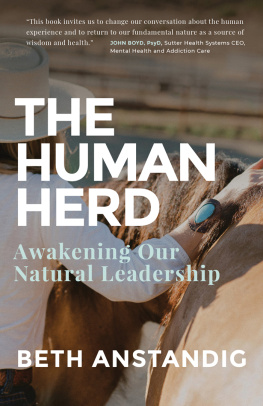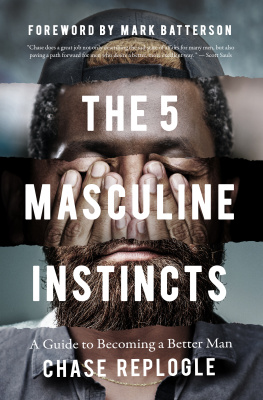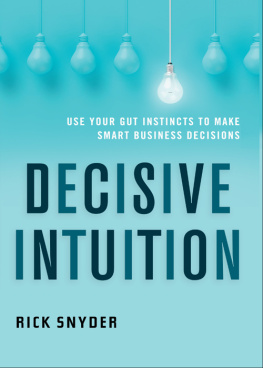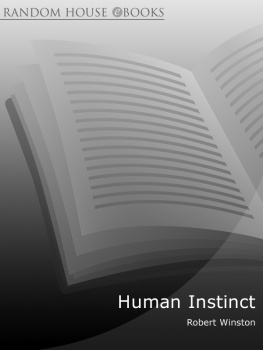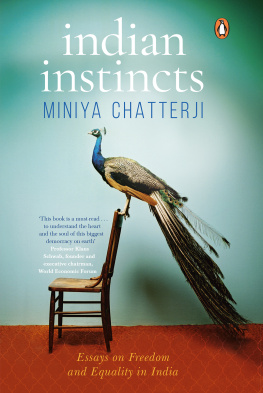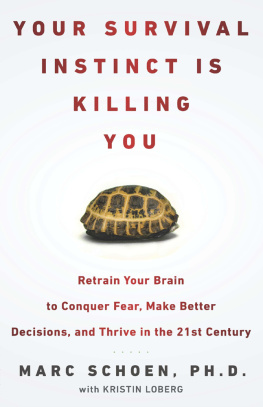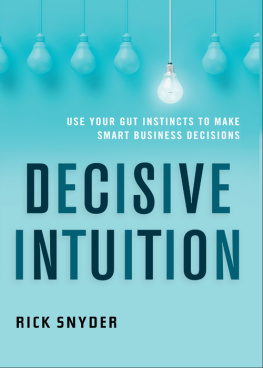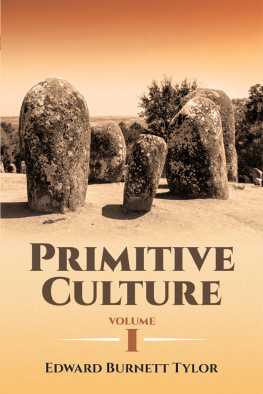Untethered
By Artem Koren
Copyright 2018 by Artem Koren
All rights reserved. No part of this publication may be reproduced, distributed or transmitted in any form or by any means, without prior written permission.
Artem Koren
Email: artem.koren@gmail.com
Twitter: @clearlykoren
Publishers Note: This is a work of fiction. Names, characters, places, and incidents are a product of the authors imagination. Locales and public names are sometimes used for atmospheric purposes. Any resemblance to actual people, living or dead, or to businesses, companies, events, institutions, or locales is completely coincidental.
UNTETHERED / Artem Koren. -- 1st ed.
ISBN N/A
Dedication
To my grandfather, who planted the seed of my curiosity.
To my mother and aunt, who taught me tenacity.
To all the great thinkers whose ideas informed and inspired my writing.
Contents
Part I: Undecided
Prologue
Through most of history, people lived in a world that could only be explained by magic. Most facts of life had to be taken for granted. With few useful explanations available, the best a person could do, was to carve out a comfortable life for themselves, have a nice family, and try not to die too soon or in too much agony.
Over the last few centuries, science has shed light on many aspects of life. We understand where people and all other animals come from, we understand a lot about the inner-workings of the brain, and we can stream Netflix to a device that fits inside your pocket.
Through all of this upheaval of understanding, we have failed to pause to consider what this new knowledge means for conducting our lives. We continue to structure and live life in the familiar way, often at the mercy of our instincts and social conditioning. We dont distinguish between our higher and our animal selves. We dont scrutinize ancient norms and beliefs. We dont reason about our existence and our intentions in the world. We are hurtling forward in time on inertia of survival that was launched by our primitive ancestors in the distant past.
I have always been curious about why people do what they do. I imagine for most people, the various feelings they experience, the relationships they have, what they strive for, and what they believe are all givens of life that are not subject to closer examination. These are simply the facts of life, and besides, there is plenty to worry about without the additional burden of pondering the meaning of it all.
Fair enough. For myself, however, this is not the case.
I have an inner drive to try to understand, to learn the truth, and live in an authentic way. I am not satisfied with explanations such as this is natural or this is the way it has always been done or this is how everyone else does it. I dont trust instincts, intuitions, and enlightened bearded men who lived long ago -- I have to have an explanation that is rooted in objective reality. I want to understand why we do what we do and I suspect at least a few others do as well.
Achieving this understanding was the impetus for writing this book.
The theme that runs throughout the book is Why do we do what we do? This may seem like a simple question at first, in practice however, the closer we examine where our decisions come from, the less intention and independent reasoning we find. Instead, we find primitive instincts and ideas that are often based on nothing more than the imagination of someone who has been dead for centuries.
The first part of this book focuses on drivers of decisions that we are born with our inborn knowledge. In chapter 1 we look at the inherent duality of being human, the contention between the reasoned and the animal self. Acknowledging that, although we experience life in an integrated way, there are two beings who vie for control of our actions, is the first step toward understanding ourselves and why we do what we do in the world.
In chapter 2 we look at the physiology of our life experience. Our brain is the hardware that powers everything we ever think or experience in life. In this chapter we look at key aspects of our brains and begin to discern how what we thought was intentional decision-making turns out to be anything but.
Next, in chapter 3, we look at our ancient past to understand why we have the instincts that we do. Evolution shaped us to act in particular ways, some of them primitive and animalistic. By accepting the animal aspect of our nature, our instincts and drives gain context and begin to make more sense.
The next several chapters are focused on those instincts that, today, shape a majority of our lives our social instincts. In chapter 4, we introduce social instincts, their origins, their utility, and explain their prevalence in modern society. Chapter 5 discusses the tribalism instinct and how it shapes how we view and act toward those whom we consider foreign. Chapter 6 digs into social status and hierarchies; we look at the various roles we play in society and some of the instincts that trigger us to defend our social status when it is threatened. Chapter 7 explores the instinct to conform and some of the ramifications of this instinct on our uses of modern technology. Finally, chapter 8 looks at the malleability of our inborn knowledge, perhaps providing some hope that we are not purely at the mercy of our genetics.
The next section of the book looks at learned knowledge. Chapter 9 explores the immense power of the human imagination. Chapter 10 looks at how we learn, which, when combined with imagination, allows us to understand, giving rise to ideas. The ideas we hold about the world are in the form of models, an important concept that chapter 11 explores.
With the fundamentals of the architecture of learned knowledge covered, we proceed to some of the products of this powerful machinery: the various aspects of human culture. Chapter 12 explores language, its development, and its role in sharing and shaping our ideas. Next, in chapter 13, we look at the ideas of norms, customs, and traditions and how authority dictates the appropriate way to behave. In addition to how we must act, a lot of our behavior is driven by what we believe to be true about the world; we look at the historical concepts of truth, justice, and the discovery of critical thinking that overturned centuries of antiquated ideas in chapter 14. Finally, in chapter 15, we look at culture as a whole, what it is, how we respond to it, and what it means in the construct of our lives.
Having explored the world of in-born and learned knowledge, we proceed to an exploration of reason the third and final method of amassing knowledge. In chapter 16, we discuss what reason is, some surprising ways logic is related to art and creativity, and how applied reason benefits our lives. Next, we explore the impact of reason on society both in technological terms (chapter 17) and in social policy (chapter 18). Finally, we look at applying reason to resolve the duality of the human condition and finding meaning and purpose in ones life in chapter 19.
The book concludes by introducing the idea of a personal culture living untethered. A way of being in the world that integrates the animal self, cultural learning, and the reasoned self to direct ones efforts toward those convictions which one deems valuable. It is hoped that this approach to life maximizes our potential as the only conscious and reasoned living creature in this part of the Milky Way.
Ultimately, what I hope you will take away from this book is an appreciation for the potential that is bound up in humanity, a realization of how blindly following our animal nature can squander that potential, and how applying reason can have a positive impact on ones own life and society as a whole.
I hope you enjoy this book.
Next page
